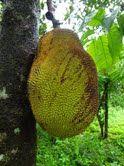 I am dedicating this blog to the wondrous fruit that is the chakka, jackfruit. The large oval fruit hangs from the trees with its green spiky covering protecting it from hungry critters. One never knows quite how to proceed when it is placed before you. Luckily, the families of Prashanthagiri have aided us in this endeavor. Once opened, many pockets of fruit and seeds are revealed. The fruit is a bit of a shock to the senses, very sweet and juicy. It is also very versatile, there exists several different ways of preparing the fruit, mashed, fried, raw. It seems analogous to the formation of relationships with the people of Prashanthagiri. At first, when meeting people it can be a bit overwhelming to get them to “open up,” as it is with the jackfruit. Once you do, you find many different “pockets” within each person’s story, each one delivering different “flavors” to the senses.
I am dedicating this blog to the wondrous fruit that is the chakka, jackfruit. The large oval fruit hangs from the trees with its green spiky covering protecting it from hungry critters. One never knows quite how to proceed when it is placed before you. Luckily, the families of Prashanthagiri have aided us in this endeavor. Once opened, many pockets of fruit and seeds are revealed. The fruit is a bit of a shock to the senses, very sweet and juicy. It is also very versatile, there exists several different ways of preparing the fruit, mashed, fried, raw. It seems analogous to the formation of relationships with the people of Prashanthagiri. At first, when meeting people it can be a bit overwhelming to get them to “open up,” as it is with the jackfruit. Once you do, you find many different “pockets” within each person’s story, each one delivering different “flavors” to the senses.
I spent the past week or so conducting Household Water Surveys with 11 of the families in Prashanthagiri. Upon entering the home, each woman of the house hurries to the kitchen to prepare us chaya and a snack. Bananas, nayapam (little warm muffin like treats-perfect on a rainy day), tapioca, and of course, jackfruit. The generosity of the families is never ending. Once we are seated with our chaya and treats, I begin asking questions related to their struggles with water. Growing up in the USA, I took it for granted whenever I walked to the sink, turned a faucet and out poured clean water, a never-ending supply. This is not the case in Prashanthagiri and many parts of India. Especially during the dry/hot season, collecting water entails trekking up and down steep inclines, with heavy, obtuse water jugs in hand. Often times, it is the women and children who are responsible for this inconvenient but vital task. For some families, the water collected from distant wells is only enough to be used for drinking and cooking purposes. For bathing, washing clothes, and “watering” the cow and buffalo, they must walk one hour each way to a river. Although many have some fond memories of these journeys, as it is something the family does together, speaking from an economist’s point of view, it is certainly not an efficient use of time.
As the people in the village have expressed the need for accessible water, Profugo is responding. Tomorrow, two engineers from ESAF, Evangelical Social Action Forum, will be visiting Prashanthagiri to assess the land where two new potential wells can be dug to alleviate the burden on these families for life’s most precious resource. I shall keep you all updated. In the meantime, when you turn that faucet and out comes clean water, take a moment to appreciate it.

Leave a Reply
You must be logged in to post a comment.